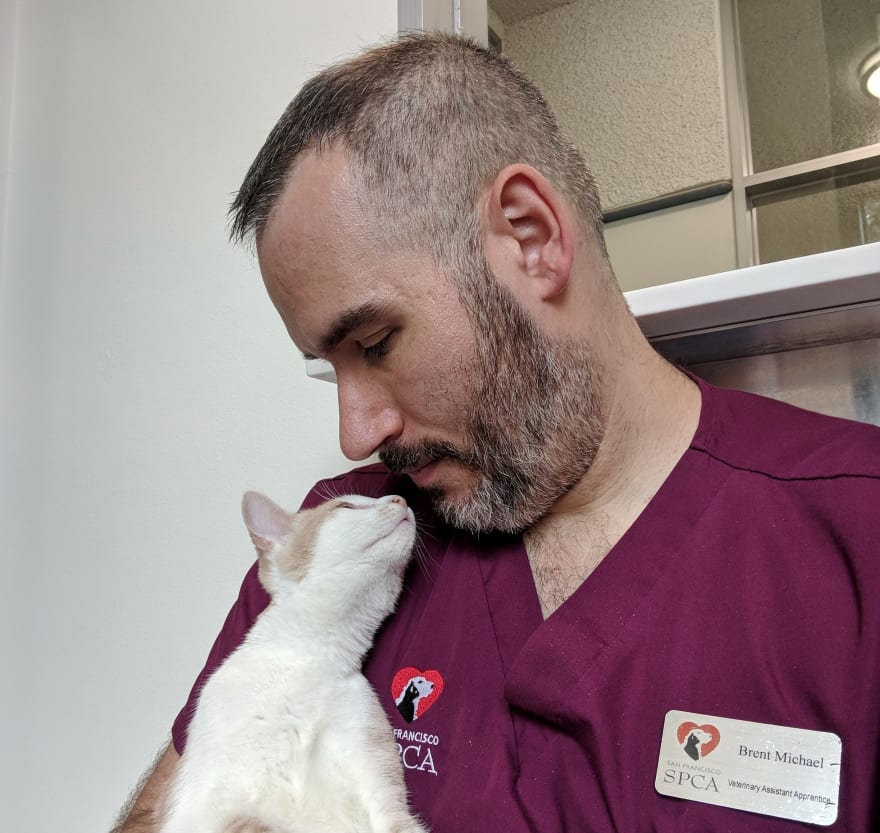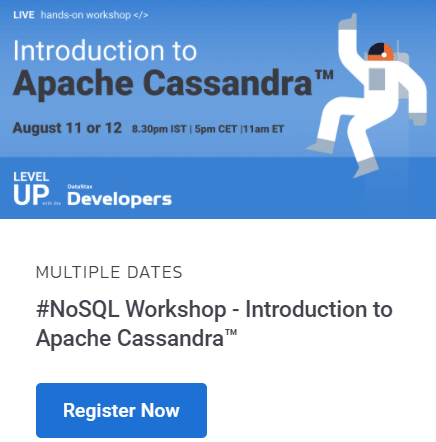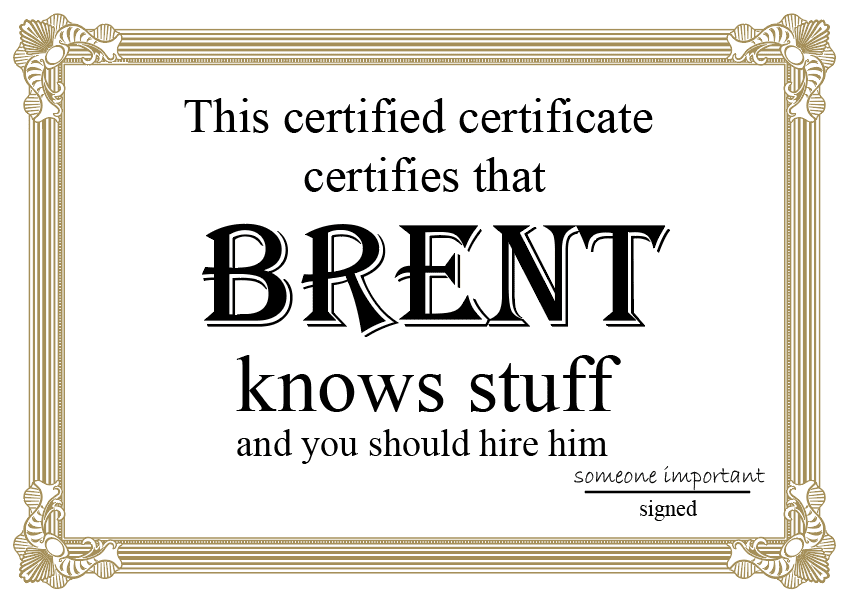Or, "how I finally stopped worrying if I can still learn CS at my age and actually started thanks to certificates"
My sob story
I am a 44 year old returning student at City College of San Francisco (shout out to my Rams!) who has always wanted to be a software engineer but was discouraged by guidance counselors and others due to the amount of math one needs for a full CS degree. Back in the wild days of the web and just after I finished my Associates Degree in Graphic Design I worked on web-based database applications with Active Server Pages (ASP), HTML, Microsoft Access (!), and an embarrassing number of <tr><td></td></tr>'s and spacer.gif's. Nowadays we call it fullstack web development. The Great Browser Wars were in full swing and Netscape was the bees knees with its promise of a better way (CSS). I was self-taught and that got me a great gig fixing up a friend's dad's online car parts warehouse website (pictured below), but finding other work was challenging without a piece of paper that said "Brent knows stuff".
Eventually after being let go in favor of a kid fresh out of college with lower salary requirements I moved to San Francisco and worked for a virtual world company as a quality assurance engineer, then a UI designer, and finally an in-world content developer. The recession hit and I was laid off along with 60-some percent of the company. This was a devastating blow to my confidence and one that put a sour taste in my mouth for anything in the tech industry. I tried to get jobs in tech but couldn't even score an interview, most likely because I didn't have a piece of paper that said Brent knows stuff. Defeated and desperate for a job that didn't involve flipping burgers, I worked for a while as a legal office assistant with a friend, then moved on to a career as a veterinary assistant. In 2019 this was quickly becoming less viable due to nerve damage in my dominant left hand and arm that was responsible for more than a few dropped syringes. My right hand and I aren't really friends--more like begrudging coworkers who lift one corner of their mouths into a bare-minimum smile when we pass each other on the way to the snack machine. Righty is useful only for carrying groceries and holding open doors, so building the dexterity needed to do the job well with my right hand was not an option. My general health started to decline due to stress and chronic pain. Arthritis in my neck and back finally convinced me to change career paths, but to do that I would need to go back to school.
From classroom to Zoom College
It had been a while since I had been in a formal school setting and I was definitely worried about being able to learn. In addition to the medical drama mentioned above, I'm also dyslexic, and many signs were pointing to a misdiagnosis as a kid with ADHD that was really Autism Spectrum Disorder. The idea of going back to school at my age surrounded by folks a score younger than me that communicated primarily through TikTok was paralyzing. I registered for Spring 2020 at City College of San Francisco as a CS major and went to classes on campus with those TikTokking youngins and--surprisingly--students who looked like me: older, probably starting a new career, probably also nervous about returning to in-person education *mumble mumble* years later, too. By mid-March I had mostly hit my stride. I was doing well in my courses and was actually very excited to be back in school. I watched every video I could find on how to study better, how to take great notes (Cornell notes and doodle notes FTW), and how to manage my time. I took notes on my Galaxy Tab with a stylus and drew a lot of pictures to help cement the ideas in my very doodly brain. Things were going great!

And then the pandemic hit and we were sent home for "two weeks" while the school figured things out with the promise that this was "only temporary".
Well, we all know how that worked out.
Online instruction started, and I found that I was doing even better in my courses, except those dreaded math courses. Learning from home was working really well for me. I didn't have to travel and I didn't have to sit in an incredibly uncomfortable lecture hall seat with a desk attached to the right side (I'm a Lefty, remember). My interactions were through Zoom so my social anxiety was mitigated. I became a tutor and a teacher's aide, and discovered that other students didn't feel the same as I did about Zoom school, so I focused on helping them succeed, which in turn supported my success.

 Josh Jordan@numbersmuncher
Josh Jordan@numbersmuncher Imagine walking into a classroom as a left-handed person and having to sit in those right-handed desks while trying to write neatly on a spiral notebook designed for right-handed people.
Imagine walking into a classroom as a left-handed person and having to sit in those right-handed desks while trying to write neatly on a spiral notebook designed for right-handed people.
The struggle is real. Happy #LeftHandersDay to my fellow lefties!15:49 PM - 13 Aug 2019
Degree schmegree, certificates FTW
Eventually I dropped math courses because I just couldn't keep up, and switched to a certificate program. I've already earned my Linux Administration certificate and I am working on a Java certificate and an Android development certificate this fall. I didn't want to lose the momentum I had built over these past semesters and so this summer I decided to keep the learning going by seeking out other online (and, where possible, free) educational programs and certifications.
Grow With Google, Succeed with Datastax
Grow with Google's Android Basics with Kotlin course was the first I tried. I found it to be fun to learn with this self-paced program and I felt an indescribable joy when I launched my first app on my Galaxy S21. I'm on track to finish this before school starts in the fall. The material requires a lot of reading, though, and being dyslexic that can slow me down. This course is one of a series that is meant to prepare students for the Associate Android Developer certification exam, which is USD $149. So, the courses may be free, but the exam will cost you.
A few days ago I decided to see if I could get a jump start on CS 150A Introduction to SQL Databases and NoSQL and for that a helpful nudge from Reddit directed me to Datastax's NoSQL Workshop series featuring AstraDB.
Prior to taking this free, live, and interactive workshop I had only heard of MongoDB, which uses a schemaless document-based data structure. AstraDB is really flexible and focuses on the AP (Availability and Partition Tolerant) in Eric Brewer's CAP theorem while providing interfaces and APIs to use this Cassandra-in-the-cloud solution with Tabular, Document-Oriented, Key Value, and Graph databases. The presenters explained advantages and disadvantages of each, and gave us the tools to learn more on our own. The workshop was incredibly useful with live, hands-on activities, a free AstraDB account with $25 credit per month, and even a voucher for free attempts at the certification test in the future, a USD $145 per attempt value! As I am a starving student this was a exciting surprise! More and more employers are looking for these certifications to show you know your stuff, and since I am no longer pursuing a CS degree these certificates are like gold, since they definitively state that Brent knows stuff. I am really grateful for the opportunity to learn these systems both in real-time interactive workshops and at my own pace self-study work. I feel that this course is setting me up for success.
Certificate programs have given me the confidence to seek out more opportunities to learn. They offer me quicker rewards than full degree programs. I can work on multiple certificates at a time, pause one while I work on another, and come back to them whenever I like. More companies like Google and Datastax are offering free or reduced price certificates, and it makes sense. I'm more likely to use Datastax cloud services if I learn from them, prompting me to evangelize in their name at whatever company I end up at. And I'll have another piece of (digital) paper that proudly proclaims that Brent knows stuff.










Top comments (0)